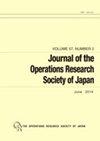大型和小型零售商的价格竞争与社会福利比较
Q4 Decision Sciences
引用次数: 0
摘要
在一些地方,大型连锁零售商与当地小型独立零售商竞争,后者专门生产当地生产的蔬菜、水果和鲜花供当地消费。前者通常通过强调其产品种类的广度和深度来吸引消费者,而后者则通过提供比连锁店更低的价格来克服其有限的产品种类。这对当地商店来说是可能的,部分原因是劳动力成本较低以及其他各种原因。本研究采用霍特林单位区间考察了一个大型连锁零售商和一个本地零售商的双寡头垄断中的价格竞争。为了表达他们产品组合的差异,我们假设由A表示的大型零售商销售两种类型的产品,G1和G2,而由B表示的本地零售商只销售G1。此外,我们假设所有消费者在比较价格后在A或B购买G1,并根据需要在A购买G2。我们检验了Nash和Stackelberg均衡,表明即使所有消费者都购买G1和G2,本地零售商也能在与大型连锁零售商的竞争中生存下来。我们还发现,如果消费者总是同时购买G1和G2,垄断市场结构而不是双头垄断可以优化社会福利。本文章由计算机程序翻译,如有差异,请以英文原文为准。
PRICE COMPETITION AND SOCIAL WELFARE COMPARISONS BETWEEN LARGE-SCALE AND SMALL-SCALE RETAILERS
In some localities, a large-scale chain retailer competes against a small-scale local independent retailer that specializes in, for instance, vegetables, fruits, and flowers produced locally for local consumption. The former usually attracts consumers by emphasizing its width and depth of products variety, whereas the latter seeks to overcome its limited products assortment by offering lower prices for them than the chain store. This is possible for the local store partly because of lower labor costs and for various other reasons. This study employs the Hotelling unit interval to examine price competition in a duopoly featuring one large-scale chain retailer and one local retailer. To express differences in their product assortments, we assume that the large-scale retailer denoted by A sells two types of product, G1 and G2, whereas the local retailer denoted by B sells only G1. Moreover, we assume that all the consumers purchase G1 at A or B after comparing prices and buy G2 at A on an as-needed basis. We examine both Nash and Stackelberg equilibrium to indicate that the local retailer can survive competition with the large-scale chain retailer even if all the consumers purchase both G1 and G2. We also reveal that a monopolistic market structure, not duopoly, can optimize the social welfare if consumers always purchase both G1 and G2.
求助全文
通过发布文献求助,成功后即可免费获取论文全文。
去求助
来源期刊

Journal of the Operations Research Society of Japan
管理科学-运筹学与管理科学
CiteScore
0.70
自引率
0.00%
发文量
12
审稿时长
12 months
期刊介绍:
The journal publishes original work and quality reviews in the field of operations research and management science to OR practitioners and researchers in two substantive categories: operations research methods; applications and practices of operations research in industry, public sector, and all areas of science and engineering.
 求助内容:
求助内容: 应助结果提醒方式:
应助结果提醒方式:


